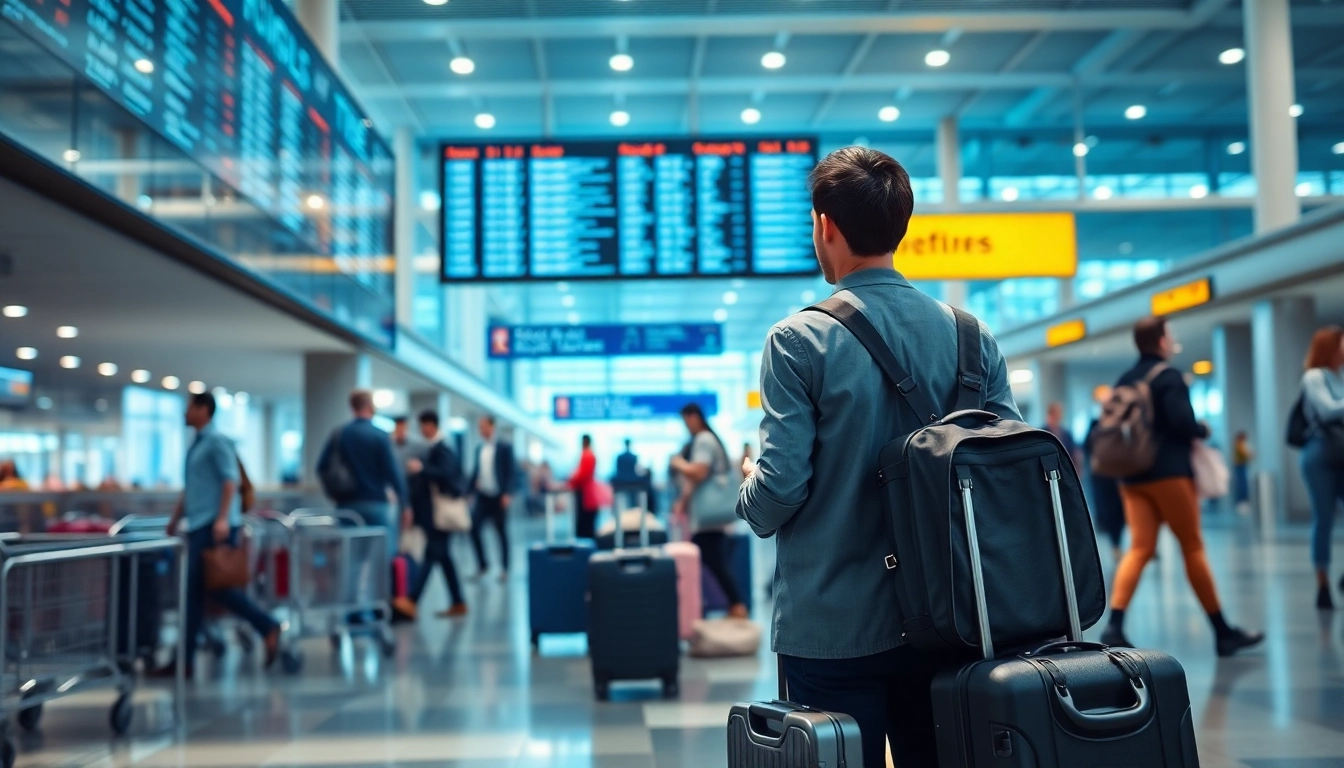Understanding Flights
Whether you are a seasoned traveler or planning your first trip, understanding flights is a fundamental aspect of travel. Flights connect us to distant lands, facilitate business ventures, and make family reunions possible. As air travel continues to evolve, the methods by which we book and understand flights are becoming more sophisticated. For those looking to navigate this landscape effectively, it’s essential to grasp the intricacies involved. For comprehensive insights on planning air travel, take a look at flights and their multifaceted dynamics.
What Are Flights?
A flight refers to the journey taken by an aircraft, which may vary significantly in length, price, and type depending on the departure and destination locations. Flights are typically categorized based on the distance covered, the altitude of travel, and the type of airline service provided. From short domestic hops to long-haul international routes, the core purpose of a flight is to transport passengers or cargo through the air.
Types of Flights
Flights can be broadly classified into several types:
- Domestic Flights: These flights operate within a single country. They are generally shorter in duration compared to international flights, making them ideal for quick getaways or business trips.
- International Flights: Flights crossing country borders can either be long-haul or medium-haul. International flights typically require additional documentation, such as passports and visas.
- Charter Flights: Unlike scheduled flights, charter flights are organized through private companies and brokers, often based on specific travel needs and preferences.
- Low-Cost Flights: Offered by budget airlines, these flights typically have lower fares than traditional airlines, though they may include fewer amenities and require additional fees for extras like baggage.
- Business and First-Class Flights: These flights provide higher levels of comfort, with enhanced services and amenities, ideal for corporate travelers seeking a luxurious experience.
How Flights Work
Understanding how flights work encompasses various aspects including booking, boarding, and travel regulations. The process typically starts with searching for flights via online platforms where passengers can compare prices, schedules, and services offered. Once booked, passengers are assigned flight times and check-in procedures that they must adhere to. Moreover, airlines and airports facilitate the operations through defined regulatory frameworks to ensure safety and efficiency. This interconnectedness amongst various components emphasizes the complexity and precision involved in air travel.
Finding Cheap Flights
Finding affordable flights is often a priority for travelers. Given the dynamic pricing models employed by airlines, a strategic approach can yield significant savings. Understanding the different factors at play can empower travelers to make informed decisions while booking. Here are some effective strategies:
Tips for Booking Affordable Flights
To secure cheap flights, consider the following tips:
- Book Early: Generally, booking flights well in advance can help you snag lower prices. Airlines often release tickets early and frequently offer discounts for early birds.
- Be Flexible with Travel Dates: If your schedule allows, being flexible with your departure and return dates can lead to lower fares. Flights on weekdays tend to be cheaper than those on weekends.
- Use Incognito Mode: When searching for flights online, using incognito mode can prevent websites from tracking your searches, which can sometimes influence prices.
- Consider Nearby Airports: Expanding your search to include nearby airports can yield more options and potentially lower fares.
- Set Up Price Alerts: Many flight search engines offer tools to set alerts for price drops for specific routes. This feature allows you to monitor fares without constantly revising your searches.
Best Times to Search for Flights
Timing can significantly influence the cost of flights. The following recommendations can assist you in finding the best times to search:
- Days of the Week: Studies show that airfare tends to be cheaper when purchased on Tuesdays and Wednesdays compared to weekends.
- Off-Peak Seasons: Traveling during the off-peak season, which varies by destination, generally results in lower prices.
- Time of Day: Mid-week flights and flights scheduled early in the morning or late at night tend to be cheaper than peak-hour flights.
Using Flight Comparison Tools
Leveraging flight comparison tools can ease the process of finding competitive prices. These platforms aggregate data from various airlines, allowing you to compare fares, amenities, and flight durations in one convenient location. Popular options include:
- Meta Search Engines: These engines allow you to search multiple booking sites simultaneously and find the best deals.
- Airline Websites: Checking airline websites directly can sometimes reveal exclusive offers or discounts not available through third-party sites.
- Travel Aggregators: Websites dedicated to travel recommend flights based on user preferences, offering comparisons between budget options and premium services.
Understanding Flight Pricing
The understanding of flight pricing is crucial for maximizing your travel budget. Various elements influence airfare, and becoming familiar with them can aid you in making smarter purchasing decisions.
Factors Affecting Flight Prices
Several key factors influence flight prices, including:
- Demand and Supply: Basic economics apply here; higher demand typically leads to increased prices, particularly during holiday seasons and school breaks.
- Fuel Prices: The cost of aviation fuel directly impacts airline operational costs, which can subsequently affect ticket prices.
- Competition: Routes served by multiple airlines often experience lower pricing due to competition, whereas monopolized routes may have higher fares.
- Booking Timing: As mentioned earlier, when you book a flight can significantly affect its cost.
How to Decode Flight Fare Classes
Flight fare classes indicate the pricing structure of flight tickets, impacting everything from seating to cancellation policies. Understanding these classes can help you wisely choose a ticket that aligns with your needs:
- Economy Class: The most basic seating option, focusing on affordability.
- Premium Economy: Provides added comfort and legroom over economy class.
- Business Class: Offers enhanced services and facilities to business travelers.
- First Class: The highest tier of service, providing utmost luxury and comfort.
Managing Expectations for Flight Costs
Understanding what to expect when it comes to flight costs can prevent disappointment. Remember that different factors, such as the time of booking and seasonality, influence prices. Setting realistic budgets and being aware of these aspects can improve your overall booking experience.
Booking Your Flights
Booking a flight may seem straightforward, but there are important considerations to ensure you secure the best deal and reduce inconveniences.
Steps to Book a Flight
Follow these steps to streamline the booking process:
- Research: Use flight comparison tools to gauge the market rate for your intended travel dates.
- Select Flight: Choose the flight that best suits your schedule, budget, and preferences.
- Enter Passenger Details: Complete all necessary passenger information accurately.
- Payment: Choose your payment method and confirm the transaction to secure your booking.
- Confirmation: Keep an eye out for a confirmation email that should include your itinerary and booking reference number.
Common Mistakes to Avoid When Booking Flights
To enhance your booking experience, avoid the following pitfalls:
- Ignoring Terms and Conditions: Always read the fine print regarding changes, cancellations, and baggage policies.
- Not Having Travel Insurance: Travel insurance can provide valuable protection should something go wrong.
- Last-Minute Bookings: Booking at the last minute can lead to inflated prices and limited options.
How to Modify Your Flight Itinerary
If changes to your itinerary are necessary, it’s important to understand the modification policies of the airline:
- Contacting Customer Service: It’s best to call the airline directly for assistance with modifications.
- Online Tools: Many airlines offer user-friendly online tools where passengers can modify bookings.
- Fees: Be prepared for potential fees when changing your flight, and ensure you review the airline’s policies thoroughly.
Post-Booking Tips for Flights
Once your flight is booked, a few additional steps ensure a smoother travel experience:
What to Do After You Book Flights
After securing your tickets, it is prudent to:
- Check for Email Confirmation: Verify that you received an email confirmation with your booking details.
- Add to Calendar: Consider adding your flight details to your calendar to keep track of dates.
- Share Itinerary: Share your travel itinerary with family or friends for safety and coordination.
How to Prepare for Your Flight
Preparation is key for a smooth journey. Here are tips on getting ready:
- Pack Wisely: Consider weight restrictions and pack accordingly, remembering essential personal items.
- Check-in Online: Many airlines offer online check-in, allowing you to select seats and print boarding passes.
- Arrive Early: Arriving at the airport early can reduce stress and allow ample time for security checks.
Understanding Flight Changes and Cancellations
Being informed about cancellation and flight change policies is critical:
- Know Your Rights: Familiarize yourself with your passenger rights regarding delays and cancellations.
- Communicate Early: If you need to make changes, inform the airline as soon as possible to avoid extra fees.
- Consider Refund Options: Understanding the refund process can help you recuperate costs if your plans change unexpectedly.



